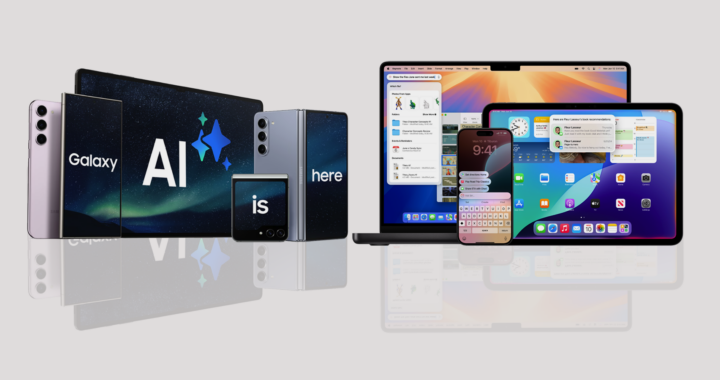Consumer electronic devices like personal computers and smartphones have long come with some artificial intelligence features even before the arrival of larger and more advanced artificial intelligence models. However, because of the widespread applications of large language models and generative AI, these devices have become smarter than before. Nevertheless, because of the ongoing AI revolution craze, Apple and Samsung have baked more advanced AI features into their products. These are called Apple Intelligence and Galaxy AI.
Comparing Apple Intelligence and Samsung Galaxy AI: What is the Difference? Which One is Better?
Similarities Between The Two Suites of AI Features
Take note that both Apple Intelligence and Samsung Galaxy AI are suites of AI features found in selected devices. Samsung first introduced its Galaxy AI with the launching of its Galaxy S24 line of flagship smartphones on 17 January 2024. Apple held its Worldwide Developers Conference on 10 June 2024 which also included the introduction of Apple Intelligence.
Galaxy AI is available in Galaxy smartphones starting from the S21 series and the Z Flip 3 and Z Fold 3 series, Galaxy tablets starting from the Tab S8 series, and Galaxy laptops starting from the Galaxy Book 4 series. Apple Intelligence is integrated with iOS 18, iPad 18, and macOS Sonoma but is only available in iPhone 15 and M-powered iPad and Mac devices.
Both suites of AI features work as on-device AI and cloud-based AI and they can run natively on devices using the artificial intelligence accelerators built into their chips or via the cloud when handling more complex tasks. Both are also based on language models, diffusion models, and computer vision models that work alongside pre-built software libraries.
Another similarity between Apple Intelligence and Samsung Galaxy AI is that both provide some standard smart features. These center on generative AI capabilities like enhanced autocorrect and text suggestions, language translation, transcription assistance, and image editing and image generation, as well as enhanced on-device and internet search.
Differences Between The Two Suites of AI Features
It would appear that Apple Intelligence and Samsung Galaxy AI are essentially the same. Both are suites of AI features designed to enhance the user interface and user experience on their respective product ecosystems. It is important to underscore the fact that both are also branding terms that represent the integration of advanced AI in consumer electronic devices.
However, upon closer inspection, the two have a different focus. Samsung Galaxy AI is more focused on communication and productivity It enhances and refines existing features and capabilities of eligible Samsung devices. Apple Intelligence is marketed as personal intelligence and is more focused on contextual understanding and privacy.
Apple Intelligence combines the power of generative models with personal context to deliver intelligence that is useful and relevant to the user. It has a tighter operating system integration and banks on strong privacy. It works as a personal assistant that can perform tasks on behalf of apps and has advanced models for its system-wide generative features.
Samsung Galaxy AI has an array of functionalities aimed at streamlining communications and boosting productivity. This is evident from its real-time language or live translation during calls or face-to-face interactions, advanced image editing features based on generative and diffusion models, and a more visual search experience using computer vision models.
Apple Intelligence vs Samsung Galaxy AI: Defining Features and Capabilities and Unique Selling Points
There are a lot of similarities between Apple Intelligence and Samsung Galaxy AI. Both represent the integration of advanced AI capabilities to improve the features of relevant devices. The two also have features or functionalities centered on text generation and image generation, as well as on intelligent personal assistance and accessing information.
However, between the two, Apple Intelligence has demonstrated a tighter software and hardware integration. It is one of the best examples of end-use AI applications. The system-wide writing assistance is more advanced. It can help users generate, rewrite, and summarize texts. It also has better and more functional image-generation capabilities.
Another defining feature of Apple Intelligence is the Apple Private Cloud Compute. This is a cloud service built on Apple Silicon exclusive to eligible Apple devices. A device accesses this cloud server to access and run inferences from larger and more advanced artificial intelligence models for more complex tasks that cannot be handled by the on-device models.
The aforementioned does not mean that Samsung Galaxy AI is inferior. It excels in live language translation that can be applied to voice calls across different apps, on-screen texts, and face-to-face or ambient conversations. It can also summarize not only texts but also voice recordings or extract key points from either texts or voice recordings.
Nevertheless, as regards choosing which between Apple Intelligence and Samsung Galaxy AI is better, it can be argued that both offer the same level of general AI features that are expected in most modern personal computers, smartphones, and tablets. The main difference between the two is their respective focus and unique approaches to making AI more practical.
